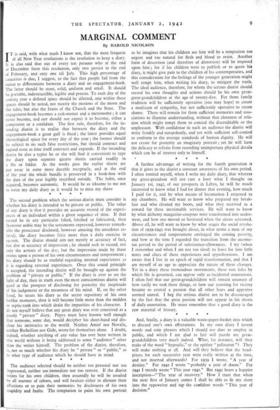A further advantage of writing for the fourth generation is
that it gives to the diarist a constant awareness of his own period. I often remind myself, when I write my daily diary, that whereas my great-grandson will not care a hoot what I thought on January 1st, 1942, of our prospects in Libya, he will be much interested to know what I had for dinner that evening, how much I paid for it, and by what means of locomotion I returned to my chambers. He will want to know who prepared my break- fast and who cleaned my boots, and what they received as a reward for these inestimable services. He will want to know by what alchemy margarine-coupons were transformed into under- wear, and how one moved or hesitated when the sirens screamed. Above all, he will want to know by what stages the social revolu- tion of 1939-1943 was brought about, in what terms a man of my circumstances and temperament envisaged the coming poverty, and how at the time I regarded the transition from the income- tax period to the period of subsistence-allowances. I try (when I remember and when I am not too tired) to leave for him little notes and clues of these experiences and apprehensions. I am aware that I live in an epoch of rapid transformation, and that I am myself of an age to appreciate the nature of these changes. Yet in a diary these tremendous movements, these vast tides by which life is governed, can appear only as incidental annotations. I often feel that our great-grandchildren will remain unaware of how easily we took these things, or how our yearning for victory became so central a passion that all other fears and appetites seemed unreal. I beg the serious diarist not to be discouraged by the fact that the great passion will not appear in his sheets of daily annotation. He must remember that a good diary is the raw material of history. * * * *


























 Previous page
Previous page